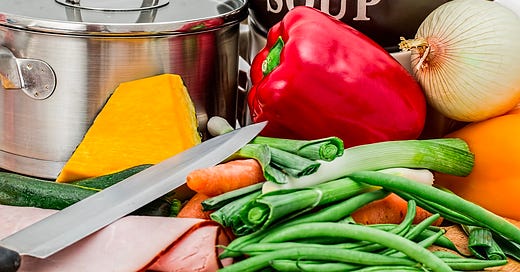What a TV Cooking Game Show Can Teach Us About Life (and Writing)
It’s all about playing the game
I can’t cook. I like watching cooking shows, though. Interestingly, they can teach us a lot about life. Also, writing. Well, cooking, obviously, but that clearly just hasn’t sunk in for me yet.
Guy’s Grocery Games, a fun cooking show that combines the intrigue of a cooking show (what will they make?) with the adventure of a game show (what are the challenges? will they burn it? what will the judges think?), provides several excellent, albeit deeply implied, life lessons that can easily extend to other areas.
On a recent re-run episode, several top chefs and former competition judges had a multi-round cooking competition, with each playing for the chance of winning $40,000 for their favorite charity. Over the course of several episodes, the competitors narrowed down to the top few. As the intrigue and suspense built, the chefs were faced with increasingly outlandish and disgusting challenges to shop for and prepare amazing meals. Interestingly, they had an additional layer of difficulty in a short time period to shop and prepare. Much like many other things in life, the challenges continued to get more difficult and the participants had to work harder to meet their goals.
The show provides notable transferable lessons to explore. [Spoiler Alert! Don’t read on if you are concerned about spoilers for a several year old episode of a cooking show currently in reruns on the Food Network.]
You’re given crap. Make it better.
With challenges on Guy’s Grocery Games like cooking only with canned products, one item from each aisle of the supermarket (yes, including the baby food aisle), or cooking a meal from less than five pounds of ingredients as they are purchased at the supermarket, the stakes are high. The contestants, while admittedly being seasoned professionals, are given challenges that seem to hover right at the border between interesting and unreasonable. Or for your average at home cook… completely impossible.
The challenges are what seem to make the show entertaining. However, some of the time it seems like the chefs are given awful ingredients and expected to transform them into something incredible. In this much less awful version of the food competition show, Chopped, the contestants seem to do exactly that. They take the challenge, the weird ingredient, or the strange mix and create a spectacular meal.
There are other times in life when this happens. We are handed crap and expected to make it better. Whether it’s your own writing, peer reviewing, or helping out a friend, maybe the writing is great or maybe it stinks. There is an important winning point here, though. There are words on the page. That really is the first and most important step. Revising from there is easier than staring at an empty document and a blinking cursor.
As we know, writing is revising. So, the first step is resolved. There’s something on the page. (That’s a win!) We can revise from there. Just like we can’t cook something from nothing, we have to start somewhere with our projects.
So, no matter how bad the project might seem, words on the page are the food game show challenges. We’re winning by having something on the page that we can present to the judges.
It’s all about the game play.
In the challenge to use pork party mix (much, much worse than it sounds, just Google it!) and prepare a lunch meal, Chef Damaris Phillips prepared an amazing looking soup and grilled cheese meal. The judges loved it! They raved about the decadent grilled cheese. Even with the pork party mix tucked away inside, the soup looked like something from a restaurant. Personally, if it wasn’t for that pork, I could see myself sitting down to a meal like that in a cute little café. (Oh, wait, COVID. I almost remember what eating out was like.)
After being the outright winner of the previous round, one of the concerns expressed by the Chef was the game play. Remember - reality TV here! We get to hear about their reflections as we watch too. Unfortunately, Chef Phillips was sent home after this amazing looking lunch, even after making the disgusting pork party mix challenge into an edible looking meal. While the meal was nice, the reason given for the abrupt dismissal from the show was this game play.
Game play? Really? Isn’t taking the pork party mix and creating something appetizing looking enough?
Almost never.
Unfortunately, most things in life are a game. No matter how childish they may be, people love games, whether they’re actual game shows or just little power trips that make everyone’s lives more difficult.
One of the biggest life lessons we can take from the show is one of the most challenging to recognize and apply. It’s all about the game play. So, we need to know the players, the game, if there are rules, and other details.
When we’re writing, it really is still all about the game play. The game play is aligning with the audience, meeting the needs of the reviewers (editors, peer reviewers, publishers), and working within the bounds of the publication venue. Even if the work is amazing, it will be rejected if it doesn’t fit the content or style of the venue.
Sometimes, this may be as simple enough as choosing the right venue. Maybe there are certain topics of interest to the venue or the editor to which we, as an outsider, are not privy. Other times, it may be the whim or biases of the editor or reviewers. While these are part of the game, sometimes it can be as simple as making sure we are trying to play the game as written.
The first step to submitting written content of any kind is to make sure it aligns with the expectations of the readers by fitting the style of the target venue. Unfortunately, this is just as easy and much more difficult than it sounds. It’s part of playing the game.
In implementation, this looks like making sure our writing aligns with the tone, word choice, formatting, and other stylistic elements of our target type of writing and venue of interest. The reality is that doing so takes practice. Then more practice. Constant self-reminders, too.
Adjusting to a new type of writing, whether it may be a classroom activity or a high impact publication, takes time, careful analysis of existing works in that style, and practice. A reminder of the first transferable skill from the show about taking crap and making it better might be useful too!
Essentially, this boils down (ah, a cooking pun!) to making sure the writing matches and aligns with the task. It needs to be what the judges are expecting. No matter if it may be a great dish, if it cannot work with the game, it will never win.
Taking two transferable lessons from an episode of a cooking game show probably is not too bad. Thankfully I didn’t make the food game show into a very tired analogy about combining ingredients, carefully mixing, and crafting a beautiful meal. I’ll attribute that to my lack of ability to cook. Anyway, I’m off to the kitchen (wish me luck!).








